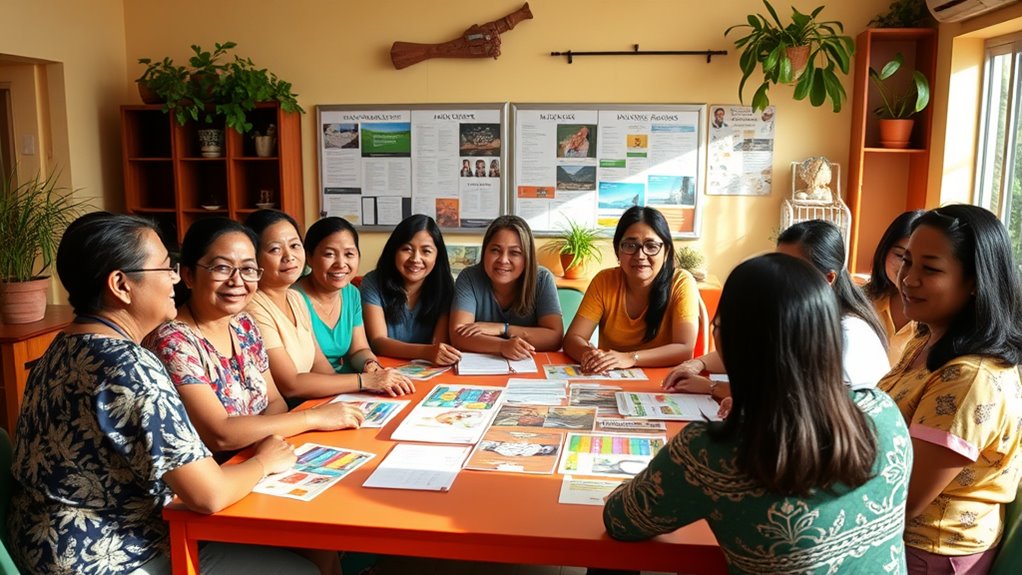Filipina wives often take the lead in family planning because cultural norms position them as primary caregivers. Their education empowers them to make informed choices about reproductive health, while community support enhances access to essential resources. As financial considerations and economic stability influence family size decisions, women are better equipped to advocate for their needs. This shift in dynamics shows a growing emphasis on shared decision-making within families. Discover more about the factors shaping these changes in family planning.
Key Takeaways
- Cultural norms position women as primary caregivers, giving them authority in family planning decisions.
- Education empowers Filipina wives, enhancing their knowledge and confidence to make reproductive health choices.
- Economic stability allows women to effectively advocate for their preferred family size and access resources.
- Increased male involvement in family planning supports shared decision-making, yet women often still take the lead.
- Community support and advocacy initiatives foster an environment where women can actively participate in family planning discussions.
Cultural Expectations and Gender Roles

While cultural influences shape many aspects of life in the Philippines, family and community ties remain at the forefront, particularly when it comes to gender roles.
In Filipino society, families often function as collective units, where decisions are made collaboratively. Women traditionally take on the role of caregivers, handling more household responsibilities, which naturally positions them to lead in family planning. The importance of eliminating unmet need for family planning services underscores the necessity for women to take charge of family planning decisions.
In Filipino families, collaborative decision-making places women at the forefront of household responsibilities and family planning.
You might notice that women are more likely to access contraceptive services, driven by cultural expectations around nurturing. However, men are becoming increasingly involved due to educational initiatives.
Economic factors also play a role; financial stability can empower women to make informed decisions about family size, reflecting an evolving dynamic in gender roles within Filipino families.
The Impact of Education on Family Planning

Education plays a crucial role in shaping family planning decisions, empowering women to make informed choices about their reproductive health. When you pursue education, you enhance your decision-making power regarding family planning.
More education means better access to reproductive health information and resources, leading to improved economic stability. This stability allows you to prioritize family planning effectively. Educated women are more likely to use family planning services consistently and engage in discussions about it within their households.
With school-based reproductive health education, awareness among youth improves, reducing unplanned pregnancies. Ultimately, increased knowledge about reproductive health directly influences your family planning practices, fostering healthier family sizes and better maternal health outcomes. The new law truly transforms the landscape of family planning for women.
Accessibility of Family Planning Services

Accessibility to family planning services is crucial for ensuring that individuals can make informed choices about their reproductive health.
The Philippine Family Planning Program aims for universal access, yet many face challenges due to legal barriers and socioeconomic status. About 6 million women need birth control, with 2 million relying on government assistance.
Outreach programs and community engagement help bring services to remote areas, but legal restrictions can limit availability. Non-governmental organizations play a significant role in spreading information and supporting service delivery.
Economic Factors Influencing Family Size

Economic factors play a significant role in shaping family size decisions in the Philippines. Higher living costs push you to contemplate smaller families to manage expenses effectively. Financial insecurity often leads you to limit family size, ensuring stability amidst uncertainty.
If your income sources are constrained, you might struggle to meet basic needs, making larger families less feasible. Additionally, the opportunity costs of educating fewer children can enhance each child’s prospects, contributing to long-term financial security.
The dynamics of the labor market also influence your choices; as more women enter the workforce, balancing career and family becomes essential. Ultimately, smaller families may allow for better resource allocation and increased income generation, fostering economic resilience.
Health Considerations in Family Planning

While considering family planning, it’s crucial to recognize the health impacts of your decisions. Effective family planning greatly reduces health risks related to frequent pregnancies, such as maternal mortality and complications from closely spaced births.
By spacing pregnancies, you lower the chances of low birth weight and premature births, which can affect your child’s health. Access to modern contraceptives allows you to control the timing of your pregnancies, ultimately improving maternal health outcomes.
Unintended pregnancies can lead to unsafe abortions and higher maternal death rates, so regular reproductive health check-ups are essential. Additionally, properly spaced pregnancies enhance child health by allowing you to focus resources on each child and recover physically and emotionally before the next pregnancy.
The Role of Empowerment and Advocacy

Empowerment and advocacy play essential roles in shaping family planning initiatives, ensuring women have the knowledge and resources to make informed decisions about their reproductive health. Programs like those from UNFPA provide important education and counseling, helping reduce the unmet need for family planning.
Empowerment and advocacy are vital for women to make informed reproductive health decisions through education and support.
Public health nurses are significant in disseminating information and supporting women’s choices. Legal support from the government, including the “Zero Unmet Need for Modern Family Planning” policy, seeks to eliminate barriers to access. Advance directives can further support women in making informed decisions regarding their health and future planning, ensuring they have a say in their medical care.
Advocacy efforts aim to lift legal restrictions, ensuring continuous availability of resources. Economic empowerment through workplace initiatives allows women to plan effectively.
Together, these strategies create a supportive environment, enabling you to take charge of your family planning decisions confidently.
The Influence of Traditional Beliefs on Family Decisions

Traditional beliefs greatly shape family decisions, often leading to hesitance in adopting modern family planning methods. Many families cling to traditional roles, limiting open discussions about contraception.
Elders’ influence remains strong; young mothers frequently seek guidance from grandparents instead of healthcare professionals. This reliance perpetuates the idea that children are divine gifts, making family planning seem unnecessary.
Additionally, religious beliefs, especially in Catholic communities, foster resistance to modern contraceptive methods. Superstitions surrounding childbirth can further complicate acceptance of new practices.
Community attitudes also play a role, as collective beliefs often sway families towards larger numbers of children. Ultimately, these traditional influences create a cycle that hinders the embrace of effective family planning options.
Women’s Agency in Reproductive Health

Women’s agency in reproductive health is essential for fostering informed decision-making about family planning. When women have access to reproductive rights, they can actively participate in deciding family size and planning.
Legislative support, like the Executive Order on “Zero Unmet Need for Modern Family Planning,” aims to remove barriers and promote access to services. However, many still face obstacles, especially those living in poverty or with financial dependence.
Economic independence empowers you to make choices about your reproductive health. Education and community involvement also enhance your ability to make informed decisions.
Community Support and Resources for Family Planning

When communities come together to support family planning, they create an environment where individuals can access essential resources and information.
The Family Planning Organization of the Philippines (FPOP) plays a crucial role by offering community-based services through over 1,000 distributors. They conduct education sessions to raise awareness and mobilize support for family planning rights, specifically targeting young people and men to encourage their involvement.
FPOP also operates permanent and mobile clinics, providing various contraceptive and medical services. Despite challenges in contraceptive availability and financial support for the needy, government initiatives aim to enhance access to these resources.
Changes in Societal Norms Regarding Family Planning

As societal attitudes evolve, conversations about family planning are shifting toward informed decision-making and reproductive health rights. You’ll notice that community perceptions are changing, leading to a greater emphasis on education and women’s empowerment.
Traditional beliefs, which once limited acceptance of modern contraception, are now challenged by younger generations advocating for shared decision-making between partners. Access to accurate information through local health organizations reduces stigma, making it easier for couples to engage in family planning discussions.
Schools incorporate reproductive health education, fostering awareness from a young age. Additionally, economic stability plays an important role; families with better resources are more likely to utilize family planning services.
Frequently Asked Questions
How Do Cultural Beliefs Shape Family Planning Discussions Among Filipina Wives?
Cultural beliefs substantially shape your family planning discussions.
In many Filipino households, traditional values emphasize male roles as decision-makers, but evolving gender norms are changing that.
You’ll find that religious influences often dictate attitudes towards contraception, impacting your choices.
Family expectations and community opinions also play a role, as you navigate the balance between respecting traditions and embracing modern perspectives.
Ultimately, these cultural factors guide your decisions and influence your family’s future.
What Role Do Husbands Play in Family Planning Decisions?
What if you took a more active role in family planning decisions?
Husbands play an essential part in this process, fostering healthier family dynamics through shared responsibilities.
By engaging in open discussions about contraceptive methods, you can strengthen your partnership and guarantee both voices are heard.
Your involvement not only enhances the decision-making process but also contributes to better outcomes for your children’s education and overall family well-being.
Are There Differences in Family Planning Practices Across Regions in the Philippines?
Yes, there are significant differences in family planning practices across regions in the Philippines.
You might notice that urban areas tend to have better access to services and a wider variety of contraceptive methods compared to rural locations.
Cultural beliefs and economic factors also play a role, influencing what methods are used and how accessible they are.
Additionally, education levels in different regions can impact awareness and utilization of family planning services.
How Do Religious Beliefs Impact Family Planning Choices for Filipina Women?
Imagine standing at a crossroads, where one path leads to religious teachings and the other to personal choice. For many Filipina women, this is their reality.
While the Catholic Church’s opposition to contraception looms large, 82% of Filipinos believe family planning is a personal decision.
Economic pressures often push women to prioritize their families’ well-being over strict religious beliefs, allowing them to navigate these complex roads and make choices that suit their circumstances.
What Challenges Do Filipina Wives Face in Accessing Contraceptives?
You face numerous challenges in accessing contraceptives, primarily due to high costs and limited availability.
If you’re living in a rural area, geographic isolation can make it even harder to find necessary services.
You might also encounter cultural stigmas or health concerns that discourage you from seeking modern methods.
Additionally, government policies can restrict access, leaving you with fewer options and inadequate support for your family planning needs.
Conclusion
To sum up, Filipina wives are often at the forefront of family planning, driven by a mix of cultural expectations, education, and economic factors. Their unique position allows them to take charge of their reproductive health, ensuring their families thrive. As societal norms shift, the influence of these women is like a tidal wave, reshaping family dynamics and empowering future generations. By embracing their role, they not only craft their own destinies but also foster healthier communities for all.









